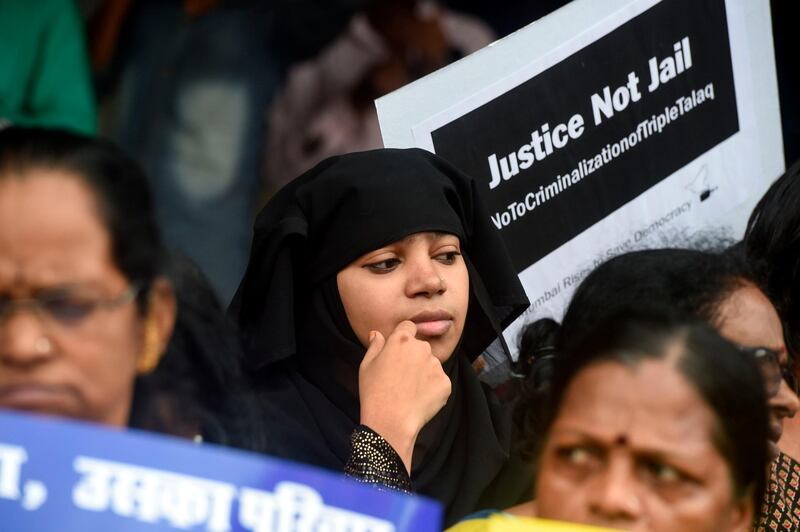Last week, India's parliament passed a bill outlawing the Islamic practice of talaq, which allowed Muslim men to divorce their wives merely by uttering the word "talaq" three times. In so doing, it reopened a debate as old as modern India itself: how deeply involved should the state be in the religious life of its people?
That philosophical question is related directly to a long-simmering political issue as well: the drive to introduce a Uniform Civil Code (UCC). The UCC is a standard set of personal laws to replace the current system, in which each religious group can deal with matters like marriage, divorce and inheritance, according to laws defined by its faith’s customs.
The debate over the UCC has its roots both in British colonialism and in India’s particular vision of a secular state. During the Raj, colonial administrators often found it convenient to refrain from interfering with religious laws. They reformed only a few of the egregious rules that violated civil liberties; in 1829, for example, Lord William Bentinck, then the governor of India, banned sati, a Hindu practice in which newly widowed women threw themselves into their husband’s funeral pyre.
When India gained independence in 1947, several of its leaders – including BR Ambedkar, the architect of the country’s new constitution – wanted a UCC. They felt the old religious laws were hidebound, patriarchal, and inconsistent. They didn’t belong in the kind of modern, liberal state that they felt India ought to be.
But legislators, whose constituents often included the religious of every faith, refused to allow such a code to be embedded into the constitution. Instead, it was merely mentioned as something the constitution ought to eventually strive for. That move encapsulated India’s approach to secularism: a desire to deal with the country’s diversity by leaving it alone as far as possible.
As a result, India has systems of Hindu and Muslim personal law, but also Sikh, Parsi and Christian law. This has resulted in a complex and varied web of legislation. Up until 2005, Hindu law did not allow daughters to inherit the property of their fathers. Christian husbands could file for divorce far more easily than their wives. In tribal areas in Assam, regional councils were left to make their own laws. In Goa, a set of civil laws is based on the civil code of Portugal, which once governed the territory.
Aspects of all of these personal law systems have been challenged in court and are often reformed to bring them in line with modern civil law. The new talaq law is just the latest example of this.
But a political divide still exists over this multiplicity of civil law codes. The Bharatiya Janata Party (BJP) and its allied Hindu nationalist groups had once opposed any attempt at uniformity. But they gradually came to regard personal laws as a way for the state – and in particular, the avowedly secular Congress party – to shelter minorities and coddle their customs, in return for their votes.
A controversial lawsuit from 1985 is still cited by members of the BJP. The Supreme Court had, in response to a petition, ruled that Shah Bano Begum’s ex-husband was still obliged to pay maintenance to her, in line with modern divorce law. The Congress government, however, passed a new law that required maintenance to be paid for just three months after the divorce, claiming this to be more in line with Islamic law.
The Begum case was a watershed in the history of Indian law. Political positions solidified around it. When the BJP first came to power in 1996, it campaigned on a promise to introduce a UCC to supplant personal law codes. That promise remained in the party's manifesto when Narendra Modi was elected prime minister in 2014 and again when he won re-election in May.
The new talaq law seems to have given both opponents and supporters of the UCC a signal that personal law codes are on their way out. The BJP has a large majority in parliament’s lower house and is likely to soon gain a similar majority in the upper house. In legislative terms, there has never been a better time for the BJP to move India towards the UCC.
But the vastness of this enterprise might well give the party pause for thought. Any effort to install a uniform code will meet fierce resistance – from opposition parties, from state governments with sizeable minority populations and from religious groups. It is sure to be challenged in multiple courts across the country, on the grounds that the state is interfering with the constitutional right to religious freedom.
Even Hindus, the core constituency of the BJP, are likely to raise objections. The Hindu code of personal law still allows for variations between communities and regions, such that, for instance, inheritance rights differ between communities in Tamil Nadu and Kerala.
Drafting a UCC will be a thorny and slow process. It will have to involve round after round of consultations with jurists, civil society organisations, religious leaders, state governments and citizens. Every step of this process will be dogged by the fear that the majoritarian BJP is attempting to impose a Hindu-inflected uniformity upon the country.
Personal law systems have been tweaked and changed before without affecting their essential existence. And there’s no question that regressive strictures still remain in every personal law system, including the Hindu code. As has happened in the past, these can still be challenged individually with success – a more attainable goal than an overhaul of all personal law.
For these reasons, the new talaq bill is likely to just be a single flare in the sky – a shorthand gesture by the BJP to show that it is still committed to erasing personal law codes, without having to undertake the hard, patient work of hammering out a uniform code that is just and equitable.





